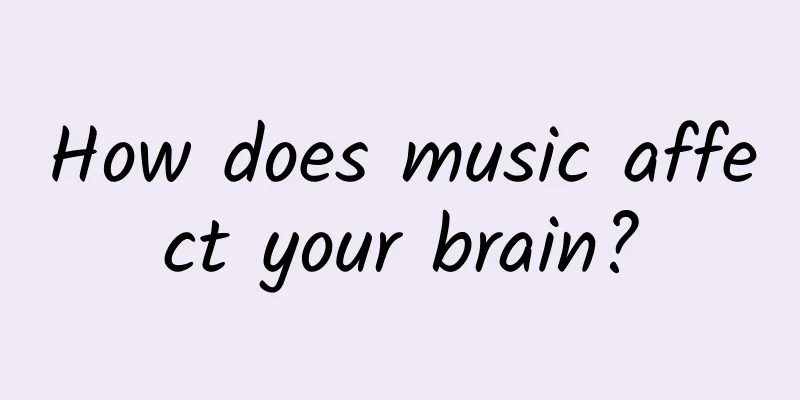How does music affect your brain?

|
Many people listen to music while working, exercising at the gym, or simply relaxing, but how does music affect your brain? In addition to triggering the release of the feel-good hormone dopamine, science shows that listening to music can enhance our cognitive function, potentially relieve symptoms of anxiety and stress, and help us stay focused. It’s no wonder so many of us choose to listen to music before, during, and after our workouts. When you hear a song, your auditory cortex — the part of your brain responsible for processing sound — is activated, as is your limbic system responsible for emotion and your motor cortex, which controls movement. As more brain areas are activated, we may begin to feel the effects of the music. For example, if you are listening to fast-paced music, you may begin to feel more alert and energized. If you are listening to relaxing music, you may begin to feel calmer and more relaxed. 0 1 Cognitive performance How many times have you memorized the lyrics to a song, but can't remember what you did over the weekend? Music does more than just fill in the gaps. In a 2008 study, published in the journal Perceptual and Motor Skills, researchers found that rhythmic listening with or without musical accompaniment "facilitated recall of text," meaning that listening to music can help us remember snippets of information. Additionally, a 2010 study on perceptual and motor skills found that music may be able to improve our cognitive functioning outside of memory tasks. The experiment had 56 male and female college students complete a language and spatial processing task while listening to 10 excerpts from Mozart's symphonies and found that background music was associated with improvements in spatial processing speed (how quickly we recognize shapes, patterns and positions of objects) and language processing accuracy (how well we process words). But why is this? According to a 2007 study published in the journal Clinical and Experimental Research in Aging, this improvement in our brain function can be explained by the "arousal and mood hypothesis." This hypothesis asserts that music can increase our arousal levels, meaning the degree to which we feel awake and alert, which puts us at an optimal level for enhancing memory. In particular, the theory suggests that adding an interesting auditory background makes the learning task more interesting, thereby increasing the learner's overall arousal level. 0 2Anxiety and Depression Music may help reduce symptoms of depression, according to a 2017 review published in the journal Frontiers in Psychology. In 26 of the 28 studies the researchers analyzed, depression levels decreased significantly over time in the group that listened to music, compared with a control group that didn't listen to music. In particular, older adults (without a specific condition) showed improvements when they listened to music or participated in music therapy. Music therapy can include listening to, playing, composing, or interacting with music. Listening to upbeat or happy music can help light up neural networks that store positive and personal memories, information that is blocked during episodes of depression and needs to be unlocked to stimulate problem-solving and adaptive, positive behaviors. Music alone is unlikely to "cure" depression, but it "can aid recovery." A 2022 review published in the journal MusicaeScientiae found that listening to music had a significant effect on reducing diagnostic anxiety across a range of populations. The authors said the most common "session length" was 30 minutes, although they suggested that comparing different durations could help draw further conclusions about how long music must be listened to to experience anxiety relief. 0 3 Pressure Prolonged stress can wreak havoc on your body. But like yoga, meditation and exercise, experts say listening to music can reduce physical and mental stress. Music "fundamentally affects the release of neurochemicals in the brain, increasing the release of serotonin and dopamine and reducing the effects of cortisol," Vyas-Lee said. He pointed to a 2015 study published in the journal The Lancet that showed how listening to music before, during and after surgery can reduce pain and stress associated with medical procedures. “But the evidence here is incomplete,” he cautioned. Based on current evidence, it appears that “music stimulates physiological and psychological emotional responses, turning on brain pathways associated with positive memories and feelings, thereby reducing stress.” 0 4 Production of dopamine Dopamine is a signaling molecule that acts as a chemical messenger in the nervous system and as a hormone that affects many tissues in the body; it plays many roles in the body, but is best known for its association with feelings of pleasure and well-being. Music can trigger the release of this feel-good hormone. When dopamine levels increase, we feel good and our mood improves. Dopamine is also involved in the brain's reward system, which explains why we often feel pleasure when listening to music. A 2019 study in the Proceedings of the National Academy of Sciences seems to support this mechanism. Researchers gave three different groups oral doses of a dopamine precursor (L-DOPA), a dopamine antagonist (Risperidone), and a placebo (Lactose), and they were tasked with listening to 10 pop songs and five of their favorite music clips. They found that the dopamine precursor L-DOPA increased the body's pleasure response compared to the placebo. Those given the dopamine antagonist had a decrease in both. 0 5 Negative effects of music It turns out that music can improve our state of mind, but it can also lower our mood — especially when we’re already in a negative state of mind. In a 2019 article published in the journal Psychology of Music, researchers found that 17% of all participants in the experiment reported feeling even sadder after listening to sad music when they were already feeling down. However, 74% of participants did not feel sad in response to sad music. Listening to sad or anger-filled music for a long time can increase the release of cortisol and stimulate brain areas associated with negative emotions. It can even turn on the threat detection system in the brain. How a person listens to music, how they interact with the music they choose, and how often they listen to a certain genre repeatedly may hold the key to their emotional well-being. Source: Chongqing Tianji Network Co., Ltd. Source: Live Science "How does music affect your brain?" Statement: Except for original content and special notes, some pictures are from the Internet. They are not for commercial purposes and are only used as popular science materials. The copyright belongs to the original authors. If there is any infringement, please contact us to delete them. |
<<: Are you over-cleaning? Don’t neglect the areas that really need cleaning!
Recommend
What tests should be done in the fifth month of pregnancy
Women must undergo some examinations after becomi...
Five weeks pregnant, stomach cramps
After pregnancy, once abdominal pain occurs, peop...
This group of "rice geeks" spent eight years developing "magic" rice
There is a rice cooker on the desk Convenient to ...
How to abort a pregnancy at 10 days
Every woman who does not plan to have a baby will...
How to maintain ovaries and what to eat
The ovaries are the most important physiological ...
What breast shape is best for girls?
Women and men both discuss breasts in private. Wo...
What should I do if I fail to conceive after four months of trying?
After getting married, having children is a must,...
What are the methods to enlarge breasts and buttocks?
In today's people's aesthetic concepts, i...
Why does my vagina feel wide and I can’t feel it?
Sexual life is the most intimate time for every c...
Unlock winter skin care: five tips to protect the beauty of your skin
Author: Mao Chong Sichuan Provincial People's...
Can I have a second child at the age of 40?
It is well known that the best childbearing age f...
How can pregnant women eat to increase breast milk? What is useful for postpartum lactation?
After giving birth, mothers will be more worried ...
Cholesterol and triglycerides, which one is more harmful to the human body? How to reduce it?
A friend asked Huazi, when checking blood lipids,...
What causes waist cramps during pregnancy?
After pregnancy, many people will experience diff...
What are the symptoms of vaginitis?
Gynecological diseases have become a major killer...









